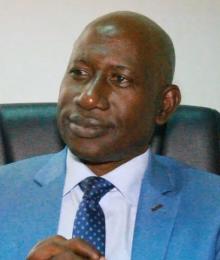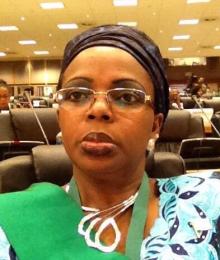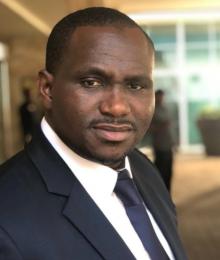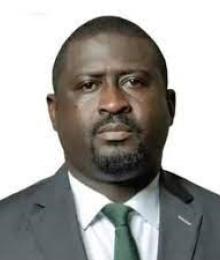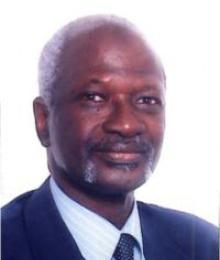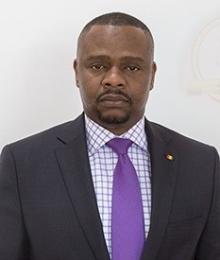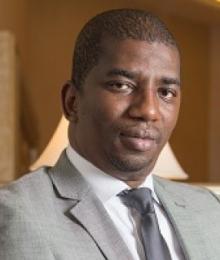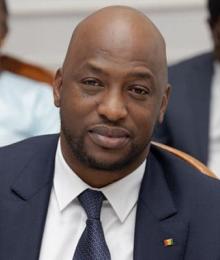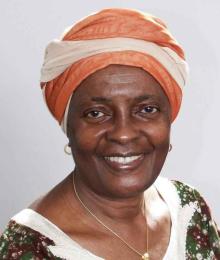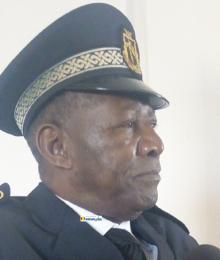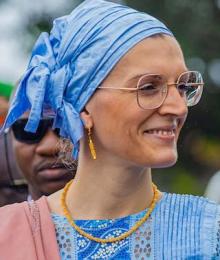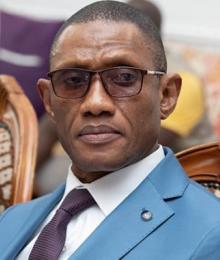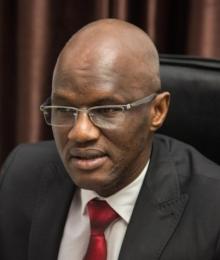
Ibrahim Kourouma (born December 15, 1966) is a Guinean pharmacist and politician. After studying in Côte d'Ivoire and at the University of Conakry where he obtained a doctorate in pharmacy, he began a political career within the Rassemblement du Peuple Guinéen (RPG). An influential member of the party, he was appointed Minister of Education (2010-2017) and then Minister of City and Territory Planning (2017-2021) under the chairmanship of Alpha Condé.
His transition to government was marked by educational reforms but also by the controversial demolition of thousands of buildings. Arrested in 2022 after the fall of Condé, he is prosecuted for alleged malversations and is currently in prison pending his trial.
Introduction
Ibrahim Kourouma (born December 15, 1966 in Beyla, Guinea) is a Guinean politician and pharmacist who experienced a flashy rise before experiencing an equally dramatic fall. He left very young in Côte d'Ivoire, where he continued his studies before returning to the country and embracing a political career under the banner of the Rassemblement du Peuple Guinéen (RPG). Appointed minister on several occasions, his transition to government has been marked by education reforms but also by controversies and allegations of misappropriation that eventually led to his arrest.
Education
Originally from Beyla, a forest Guinea prefecture, Ibrahim Kourouma left his home country very early for Côte d'Ivoire. In 1985 he obtained his First Cycle Study Patent (BEPC) from the Cocody College of Orientation in Abidjan. Returning to Guinea, he completed the second part of his bachelor's degree in experimental science at the Conakry Printing School in 1986-1987.
With this diploma, the doors of the Gamal Abdel Nasser University of Conakry were opened to him. He enrolled at the Faculty of Medicine and Pharmacy where he obtained his state doctorate in pharmacy in 1992.
Professionnal career
Parallel to his university studies, Ibrahim Kourouma became involved in the student association life very early. Since the introduction of integral multipartyism decreed by President Lansana Conté between 1991 and 1993, the young graduate, then the founder of the student movement Union Nationale des Élèves et Étudiants Patriotes (UNEEP), was chosen as the representative of this organization at the Forum Démocratique National.
This first political experience allowed him to make himself known and to climb the ladder within the Rassemblement du Peuple Guinéen (RPG), the opposition party of the time. He became Chairman of the Action and Initiative Reflection Group (GRAIN-RPG) before joining the National Political Bureau and the National Youth Office of the RPG.
On a professional level, Ibrahim Kourouma works as a pharmacist, being the owner of the Elohim pharmacy located in Lambanyi, a suburb of Conakry. He is also a member of the Executive Office of the National Union of Pharmacists of Guinea (UNAPHARM), responsible for regulation, legislation and taxation.
Between 2001 and 2003, he held the position of medical delegate for the French pharmaceutical company THETAPHARM in Guinea. In this capacity, he is responsible for the promotion of the company's molecules on the national territory and the monitoring of relations with the various hospital centres in the country.
Political career
Ibrahim Kourouma's political rise accelerated after Alpha Condé was elected to the presidency of Guinea in 2010. Rewarded for his loyalty to the RPG, now in power, he was appointed in December 2010 to the post of Minister of Pre-University Education and Civic Education.
Minister of Education (2010-2017)
At the head of this strategic department, Ibrahim Kourouma embarks on a comprehensive policy of reforms aimed at redressing the Guinea education system. Its action focuses on combating exam fraud and the trafficking of false diplomas, with systematic penalties at the key.
His department is moving into a new building adjacent to the presidency's services, a sign of the importance the new regime attaches to education. Kourouma even repeatedly replaced the Government spokesman for the reading of the Council of Ministers statement.
Minister of Cities and Regional Planning (2017-2021)
On 23 August 2017, Ibrahim Kourouma was appointed Minister of City and Territorial Planning, a position he would hold until the fall of the Alpha Condé regime on 5 September 2021.
As part of his new duties, he oversaw major urban planning projects, but his department was also accused of destroying private buildings, in the Kaporo Rails district in Conakry.
Recovery of state domains
One of the main tasks entrusted to Ibrahim Kourouma as Minister of the City is the recovery of the territories of the State illegally occupied by individuals. This controversial operation, carried out under the umbrella of emergency, has resulted in the demolition of thousands of buildings in the Guinean capital and its surroundings.
According to a Human Rights Watch report, at least 2,500 buildings were demolished at Kaporo Rails, Kipé and Dimesse in February and March 2019, officially because a decree had classified the area as a state land reserve.
These massive demolitions raise a riot among the population, with many families being left homeless from day to day. Kourouma and his Secretary-General Mohamed Maama Camara have even been prosecuted for illegal destruction and abuse of authority.
Arrest
The fall of Alpha Condé after the September 2021 coup marks the beginning of legal trouble for its former city minister. Ibrahim Kourouma was arrested on April 21, 2022 and imprisoned at the Conakry headquarters.
He is charged with alleged acts of misappropriation and complicity in misconduct of public money, illicit enrichment, corruption and laundering. A case that his lawyer, Mr Soufiane Kouyaté, describes as "pure political" aimed at "museling" the former ministers of Alpha Condé.
Despite four release orders obtained by his defence, Kourouma remains behind bars. The Special Prosecutor's Office of the Court for the Suppression of Economic and Financial Crimes (CRIEF) strongly opposes his release, multiplying appeals to delay the proceedings.
Private life
Few elements filter about Ibrahim Kourouma's privacy. It is known that he was born in Beyla in the forest region of Guinea and that he studied part of his youth in Côte d'Ivoire before returning to complete his graduate studies in his home country.
Married and a family father, the former minister has always cultivated an image of discretion, preferring to stay in the shadows and focus on his functions rather than on his personal sphere.
Raised in the Muslim tradition of the majority of Guineans, Ibrahim Kourouma is a man who attaches great importance to family values and education, themes that were at the heart of his work when he was head of the Ministry of Education.
Beyond politics, he is known to be a big fan of sports, especially football. In his youth, he co-founded the University Circle of Conakry for the Promotion of Sports and Culture.
Conclusion
The story of Ibrahim Kourouma perfectly illustrates the saying that greatness can be followed by misfortune. Starting little with studies partly conducted abroad, this son of Forest Guinea has managed to climb the ladder to the highest spheres of power.
A prominent member of the RPG, the Alpha Condé party, he was awarded strategic ministerial posts as soon as the latter came to the presidency in 2010. First in charge of Education where he tried to push reforms, then of City and Territory Planning, a portfolio on which he suffered fierce criticism for his muscular management.
Operations under his command to recover the State's territories have resulted in thousands of forced evictions and demolitions, which have largely disrupted his record. Since the fall of Alpha Condé in 2021, Ibrahim Kourouma was also in the sight of the new junta.
Arrested and prosecuted for various alleged misconduct, he is now in prison waiting for a trial whose outcome remains uncertain. As a brilliant member of the governmental elite, he has thus, in a few years, passed to the rank of accused, in one of those glowing defecations that embellish History.
In shadows and lights, the rise and fall of Ibrahim Kourouma alone summarizes the difficulties of political life, where greatness can be followed by equally sudden misfortunes. A fate for the least controversial, like the reign of Alpha Condé himself.











